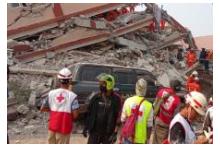Urgent Help Needed: Earthquakes in Myanmar
チャリティ活動名 International Committee of the Red Cross*What is happening?
On 28 March, a devastating 7.7 magnitude earthquake hit Myanmar. Early reports indicate that thousands of people have been displaced, injured, killed or become unaccounted for. As at the time of writing, around 1,700 were reportedly killed and over 3,400 injured. Casualty figures are expected to rise, as local actors continue to pursue efforts to rescue people that remain trapped under the rubble and recover human remains. Many people are still out in the streets, afraid to venture back into their homes for fear of aftershocks.
The earthquake has caused severe and extensive damage to residential and public buildings, roads, bridges, health facilities and other critical infrastructure, leaving people with limited or no access to shelter and essential services such as health care, water and sanitation. Electricity and communication networks are also down in several places , making it difficult for people to maintain contact with their loved ones. The areas most affected by the earthquake – particularly Mandalay – are also facing extreme heat, reaching up to 40 degrees Celsius in the daytime.
This crisis has had an immense impact on people who are already dealing with the effects of armed conflict and other situations of violence. Communities in Shan state and Mandalay and Sagaing regions – which were all hit by the earthquake – are among the areas most affected by violence. In these places, and several others, the fighting among weapon bearers has had grave consequences, such as civilian deaths and the closure of major hospitals.
What is the ICRC doing?
The ICRC has been working in Myanmar since 1986, with 572 staff based in 12 structures across the country. It provides family-links services, supports a range of health services, helps restore livelihoods, repairs essential infrastructure, and promotes safer behaviour around mines and explosive remnants of war, among other activities in the country.
Together with the Myanmar Red Cross Society, the International Federation of Red Cross and Red Crescent Societies and other International Red Cross and Red Crescent Movement (Movement) partners, it is preparing to help those affected by the earthquake, particularly communities that had already been dealing with the effects of conflict and other violence.
► On 30 March, A Myanmar Red Cross and ICRC envoy left Yangon to provide medical support for teams that are rescuing wounded people from the debris. The ICRC also donated six emergency health kits, each of which contains enough supplies to serve the medical needs of 10,000 people for three month s. It also donated 600 body bags to help ensure the proper management of human remains, thereby improving the chances of families being notified of their loved ones’ fate.
► Additional health supplies are being dispatched to support medical responders; these include medical kits, body bags and chlorine tablets given the heightened risk of cholera and diarrhea. The ICRC is coordinating its material donations with the local responders and other pertinent actors. It will also support the establishment of four Myanmar Red Cross emergency response teams, including mobile clinics.
► To help people gain access to clean water, the Myanmar Red Cross will deploy water-treatment units in Sagaing, Mandalay and Nay Pyi Taw to support about 2,500 people; the ICRC helped to repair these units and trained National Society staff in their use. Renovation of health facilities will also be one of the ICRC's priorities.
► The ICRC’s emergency stocks include food rations (rice, pulses and oil), tarpaulins, and kits of essential items for thousands of people, preparations for distributions are ongoing.
► With the Myanmar Red Cross, International Federation and other Movement partners, the ICRC is prepared to help reconnect family members who have been separated from each other or are searching for their loved ones.
How you can help?
► 56 CHF provides a monthly food ration consisting of rice, peas, vegetable oil, sugar, salt, and canned fish to a family of five.
► 120 CHF provide 1'000 chlorine tablets to disinfect 10'000 liters of water.
► 300 CHF provide elastic bandages to 300 injured persons to immobilise sprained or dislocated joints, to secure dressing and exert small amounts of pressure.
Title picture credit: Myanmar Red Cross Society
